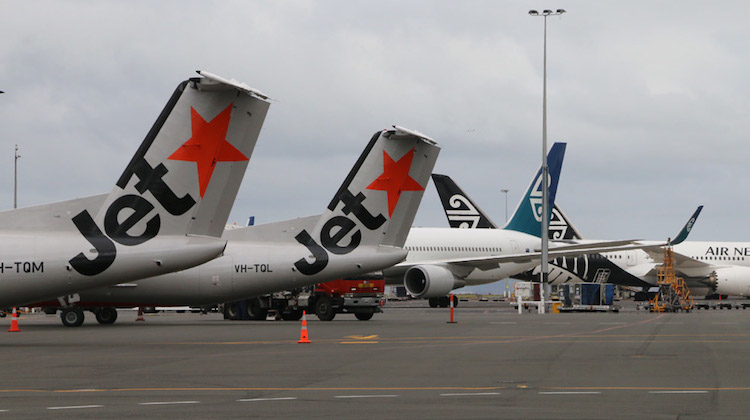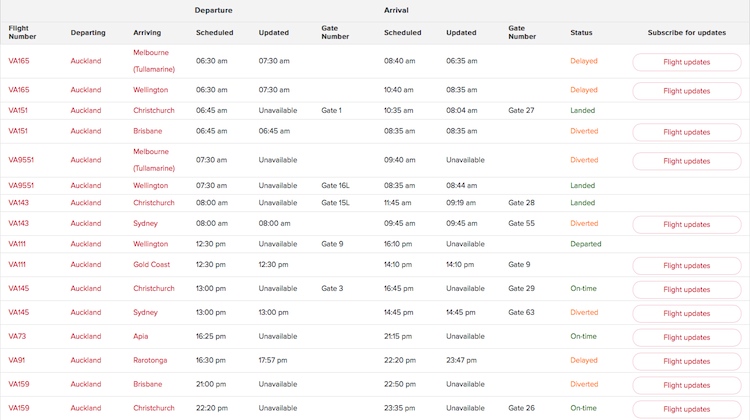
Air New Zealand has been forced to cancel flights and reroute its long-haul operations after a damaged pipeline led to severe fuel shortages at Auckland Airport over the weekend.
News of the damaged pipeline, which connects a refinery to the Wiri Oil Services facility near the airport, first emerged on Sunday, when Auckland Airport announced on Twitter there were fuel shortages.
1/2: Due to a fuel shortage in Auckland, oil companies are limiting the amount of fuel being supplied to airlines at Auckland Airport.
— Auckland Airport (@AKL_Airport) September 16, 2017
2/2: This is impacting flights so passengers should contact their airlines or view latest flight information. https://t.co/vAjz6c8auG
— Auckland Airport (@AKL_Airport) September 16, 2017
With supply to airlines reduced to only 30 per cent of normal usage, airlines including Air New Zealand were forced to cancel flights and reroute some services to pick up fuel enroute to or from Auckland.
Air New Zealand said on Monday it had cancelled 17 domestic and trans-Tasman flights scheduled for Monday and Tuesday, and was taking more fuel on domestic jet services from Wellington or Christchurch to limit refuelling in Auckland.
Meanwhile, a number of its flights between Auckland and North America will operate with a refuelling stop at selected airports in the Pacific such as Nadi, Fiji.
And some Asian services will also be impacted, such as Monday’s NZ99 from Auckland to Tokyo Narita which will make a refuelling stop in Brisbane.
Air New Zealand said about 2,000 passengers would be affected by by flight cancellations on Monday, with all passengers to be contacted directly on any schedule changes. Further disruptions are likely for later in the week.
“Aviation is a critical transport industry and the lifeblood for tourism and we are naturally extremely disappointed with this infrastructure failure,” Air New Zealand chief operations integrity and standards officer Captain David Morgan said in a statement on Monday.
“We are continuing to do everything we can to respond to this infrastructure challenge and further disruption is likely as we move through the rest of this week. We apologise to our customers for the inconvenience caused and continue to ask for their patience.”
Refining New Zealand chief executive Sjoerd Post told the Radio NZ website the pipeline was expected to be shut for “10 to 15 days”, with the company looking at ways to get more fuel to the airport by road or ship.
Further, the company said in a statement to the New Zealand stock exchange on Monday engineers were at the site of the leak about eight kilometres south of the refinery.
“The company expected that the repair could be effected within two days by installing a clamp on the damaged section of the pipe,” it said in a statement.
“However, closer inspection after excavating the pipeline has shown that the damaged section needs to be replaced. Our team is now preparing for this work.”
Even after the repairs are complete, Refining New Zealand said the pipeline would initially operate at 70-80 per cent of full capacity.
Auckland Airport chief executive Adrian Littlewood said additional staff would be deployed to assist passengers disrupted by the fuel shortage.
Jetstar, Qantas and Virgin Australia were also advising their passengers to expect disruptions to flights into and out of Auckland, with some services taking in refuelling stops in either Wellington or Christchurch.

Board of Airline Representatives New Zealand (BARNZ) executive director Justin Tighe-Umbers called for patience while airlines worked through the fuel shortage.
“Airlines are working hard to minimise rescheduling and the knock-on effect this will have with travellers’ connections to other flights,” Tighe-Umbers said in a statment.
“Logistically this is a significant challenge and it will require travellers to not only check their flights, but to have patience while NZ Refinery works to repair the pipeline and restore the flow of jet fuel to the Wiri terminal and Auckland Airport.”
BARNZ represents 28 international airlines flying into and out of New Zealand.
Meanwhile, the Board of Airline Representatives of Australia (BARA) noted the reliance on a single supplier of fuel at key international airports was also an issue on this side of the Tasman, such as the shortages at Melbourne Tullamarine in 2015.
“The fuel reliability problems at both Australian and New Zealand airports directly impact passengers, freight forwarders and airlines,” BARA executive director Barry Abrams said in a statement.
“BARA has long argued that supply chain constraints and lack of effective competition among jet fuel suppliers stymie industry performance and will impede ongoing growth.
“Market-based reforms, including fair and reasonable access to on-airport jet fuel storage and distribution systems, are necessary to enable effective competition between suppliers and support reliability and industry resilience.”




